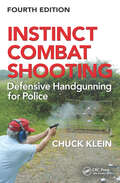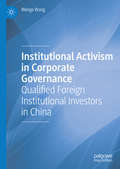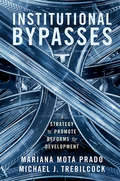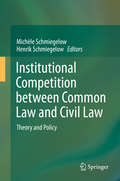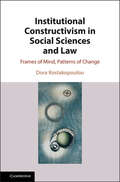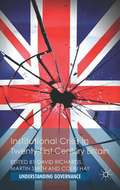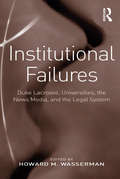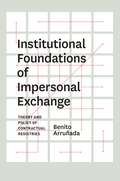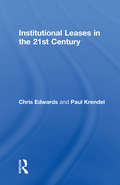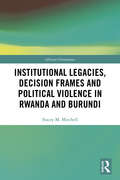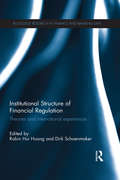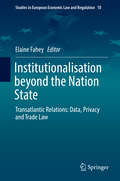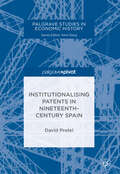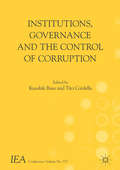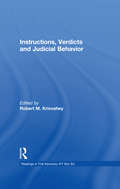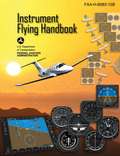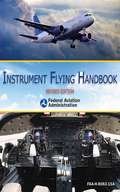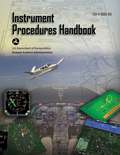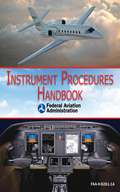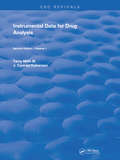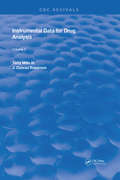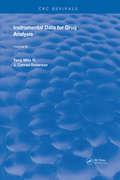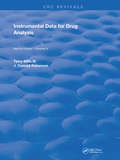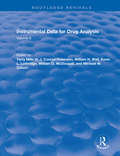- Table View
- List View
Instinct Combat Shooting: Defensive Handgunning for Police, Fourth Edition
by Chuck KleinWhile much has been written about instinct shooting with long guns, very little had been published on doing so with a handgun until this publication. Written by a pioneering author of the concept, Instinct Combat Shooting: Defensive Handgunning for Police, now in its fourth edition, is not about winning target shooting competitions, but purports surviving real-life firefights by examining testimonies of shootout survivors and carefully analyzing firefights that prove shooting instinctively is not only crucially fast, but also equally accurate. The book defines instinctive combat shooting as: "The act of operating a handgun by focusing on the target, as opposed to the sights, and instinctively coordinating the hand and mind to cause the handgun to discharge at a time and point that ensures interception of the projectile with the target." The concepts behind instinct combat shooting discussed in this book are now being integrated into some of the most progressive police academies in the United States and around the world. New chapters provide valuable material dispelling myths on indexing, laser sights, and other trick-shooting methods. Intended to help officers survive close-quarter combat conditions, Instinct Combat Shooting is an essential tool for police looking to improve their close-range shooting skills and enhance their firefight survival.
Institutional Activism in Corporate Governance: Qualified Foreign Institutional Investors in China
by Wenge WangUsing both qualitative and quantitative methods, this book examines whether qualified foreign institutional investors (QFIIs), through their shareholder activism, have a meaningful positive impact on the corporate governance of firms listed on the mainland Chinese stock market. Capital flows into and out of China are still subject to tight controls, and the QFII scheme is one important avenue through which QFIIs can become invested in the Chinese stock market. This book is an invaluable resource for anyone interested in learning about ways to invest in one of the world’s largest economies. Wang discusses in depth what specific opportunities, challenges and restrictions to expect in the process, and how investing in China differs from investing in countries with a more open capital account.
Institutional Bypasses: A Strategy to Promote Reforms for Development
by Michael J. Trebilcock Mariana Mota PradoInstitutional bypass is a reform strategy that creates alternative institutional regimes to give citizens a choice of service provider and create a form of competition between the dominant institution and the institutional bypass. While novel in the academic literature, the concept captures practices already being used in developing countries. In this illuminating book, Mariana Mota Prado and Michael J. Trebilcock explore the strengths and limits of this strategy with detailed case studies, showing how citizen preferences provide a benchmark against which future reform initiatives can be evaluated, and in this way change the dynamics of the reform process. While not a 'silver bullet' to the challenge of institutional reform, institutional bypasses add to the portfolio of strategies to promote development. This work should be read by development researchers, scholars, policymakers, and anyone else seeking options on how to promote change and implement reforms in developing countries around the world.
Institutional Competition between Common Law and Civil Law
by Michèle Schmiegelow Henrik SchmiegelowThis book addresses two countervailing challenges to theory and policy in law and economics. The first is the rise of legal origins theory, which denies the comparative law view of convergence between common law and civil law by the assertion of an economic superiority of common law. The second is the series of economic crises in the very financial markets on which that assertion was based. Both trends unsettled certainties about the rule of law and institutional economics. Meeting legal origins theory in its main areas of political science, sociology and economics, the book extends the interdisciplinary reach to neglected aspects of comparative law, legal history, dynamic econometric analysis and "quasi-natural experiments" with counterfactual evidence of different institutional regimes in divided countries. These combined methodological tools make tests of the economic impact of different legal origins much more reliable. This is shown for developed and newly industrialized countries as well as developing, transforming and emerging countries with or without financial center advantage, affected or not by financial crises. The Asian financial crises and the American subprime crisis have been, or could have been resolved using the resources of common law or civil law These cases and data on access to justice in Africa, Asia and Latin America reveal the problem of substantive law remaining "law on the books" without efficient procedural rules and judicial structures. The single most striking common law-civil law divide is that lawyer-dominated common law procedure is slower and costlier than judge-managed civil law procedure. Countries as diverse as the Netherlands, Japan, and China show functional interaction between culture and law in legal reforms. Such interaction can reduce the occurrence of legal disputes as well as facilitate their resolution. It can use economic crises as catalysts for legal reforms or rely on regional integration, and it should replace the discredited method of legal "transplants" by sustained dialogue between legal advisors and all actors involved in legal reforms.
Institutional Constructivism in Social Sciences and Law: Frames of Mind, Patterns of Change
by Dora KostakopoulouThis book proposes a new institutional constructivist model, for social scientific and legal enquiries, based on the interrelations within the social and political world and the application of change in EU laws and politics. Much of the research conducted in social sciences and law examines the diverse activities of individuals and collectivities and the role of institutions in the social and political world. Although there exist many vantage points from which one can gain entry into understanding how agents in the world act, interact, shape and bear the world, socio-legal scientific epistemology has found monism and dualism to be convincing models. This book argues that current models do not capture the complexity of our micro-worlds, macro-worlds and meso-worlds. Nor can they account for the forms and patterns of socio-legal change. Mind, time and change are brought together in an attempt to contribute to socio-legal epistemology and to enhance its toolkit.
Institutional Crisis in 21st-Century Britain
by Martin Smith David Richards Colin HayIn 21st century Britain, a 'perfect storm' seems to have engulfed many of its institutions. This book is the first wholesale consideration of the crisis of legitimacy that has taken root in Britain's key institutions and explores the crisis across them to determine if a set of shared underlying pathologies exist to create this collective crisis.
Institutional Failures: Duke Lacrosse, Universities, the News Media, and the Legal System
by Howard M. WassermanThe authors of this new collection argue that the many features of the now-infamous Duke University men’s lacrosse controversy are best understood in the context of the three major socio-legal institutions in which the drama played out. The legal system, Duke University, and the news media all struggled to respond to and handle the case, tinged as the events were with race, sex, violence, class, privilege, and notions and perceptions about sports. The problems, missteps, mistakes, and injustice in the case resulted from each institution's failure to operate properly, from the incentives built into each institution that affected individual behavior, and from the inability of each institution to communicate and cooperate with the others. To understand the Duke lacrosse controversy is to study these institutions and to answer questions about the performance of each-to learn what each did right and wrong and why, and to consider how each can improve in the future. By examining the actions of these institutions and the individuals within them, these essays consider the role each played in the case, how each contributed to the crisis and to its resolution, the ways in which they interacted with one another, and the lessons this case teaches about the appropriate functioning of each institution.
Institutional Foundations of Impersonal Exchange: Theory and Policy of Contractual Registries
by Benito ArrunadaGovernments and development agencies spend considerable resources building property and company registries to protect property rights. When these efforts succeed, owners feel secure enough to invest in their property and banks are able use it as collateral for credit. Similarly, firms prosper when entrepreneurs can transform their firms into legal entities and thus contract more safely. Unfortunately, developing registries is harder than it may seem to observers, especially in developed countries, where registries are often taken for granted. As a result, policies in this area usually disappoint. aBenito Arruada aims to avoid such failures by deepening our understanding of both the value of registries and the organizational requirements for constructing them. Presenting a theory of how registries strengthen property rights and reduce transaction costs, he analyzes the major trade-offs and proposes principles for successfully building registries in countries at different stages of development. Arruada focuses on land and company registries, explaining the difficulties they face, including current challenges like the subprime mortgage crisis in the United States and the dubious efforts made in developing countries toward universal land titling. Broadening the account, he extends his analytical framework to other registries, including intellectual property and organized exchanges of financial derivatives. With its nuanced presentation of the theoretical and practical implications, "Institutional Foundations of Impersonal Exchange" significantly expands our understanding of how public registries facilitate economic growth. "
Institutional Leases in the 21st Century
by Chris Edwards Paul KrendelSince the 1980s the "institutional" lease has undergone a dramatic transformation. Landlord-orientated FRI leases for a term of twenty-five years with no breaks and upwards-only rent reviews have retreated before market demands for shorter, more flexible letting arrangements and, recently, in the face of threatened legislation. Nevertheless, valuers and lawyers will have to understand and deal with the 1980s leases until well into the second decade of the twnety-first century.The book sets out to explain the main changes that have occurred since the early 1990s (such as the rules relating to privity of contract). It also provides guidance on the factors driving further change, including the Code of Practice for Commercial Leases and the proposed new accounting standards.
Institutional Legacies, Decision Frames and Political Violence in Rwanda and Burundi (African Governance)
by Stacey MitchellRwanda and Burundi are strikingly similar countries that underwent democratization in the early 1990s. In both, resistance to democratic reforms led to coups d’état and presidential assassinations. A conundrum arises in terms of what transpires next. In Rwanda, total genocide was perpetrated by extremist Hutu actors, including government officials, upon the country’s Tutsi and politically moderate Hutu populations. In Burundi the coup d’état failed and instead ushered in a lengthy period of civil war. This divergence in outcome is puzzling given the similarity of these two countries, and it is not adequately explained by studies that address collective violence in each. This book utilizes an integrative approach that facilitates the formation of an explanation that more fully accounts for variation in the type of collective violence that occurred in Rwanda and Burundi. Showing that political actors – during periods of major institutional change – do not all respond to or perceive reform in the exact same manner or in a necessarily rational manner, this book makes an important contribution to the literature on ethnic conflict, collective violence and democratization in Africa.
Institutional Structure of Financial Regulation: Theories and International Experiences (Routledge Research in Finance and Banking Law)
by Dirk Schoenmaker Robin Hui HuangIn light of on-going global financial crises, the institutional structure of financial regulation is currently a subject of significant academic and practical interest. The financial crisis has called into question the adequacy of financial regulation at the national and supranational levels, and has instigated financial regulatory reforms in major markets overseas. This has included the enactment of the Dodd-Frank Act in the US, and the programme to split the Financial Services Authority in the UK. This book examines the institutional structure reform of financial regulation from a comparative perspective, exploring both fundamental theories and international experiences. The book explores the three main institutional structures of financial regulation in the world; the sectors-based model, adopted in the US, Mainland China and Hong Kong; the twin-peaks model with Australia and the Netherlands as its pioneers; and the single-regulator model as represented by the former Financial Services Authority in the UK and the Financial Services Agency in Japan. The book contains contributions from renowned experts in the field of financial regulation including Douglas Arner, Jeffrey Carmichael, Robin Hui Huang, Dirk Schoenmaker, and Michael Taylor, and will be of interest to students and researchers of banking and finance law, and comparative economics.
Institutionalisation beyond the Nation State: Transatlantic Relations - Data, Privacy And Trade Law (Studies in European Economic Law and Regulation #10)
by Elaine FaheyThis volume collects papers that explore institutionalisation in contemporary transatlantic relations. Policymakers, lawyers, and political scientists reflect on contemporary understandings of the process as an integration of regimes and orders from an EU perspective. The papers assess whether contemporary transatlantic relations call for a different approach to global governance with a heightened emphasis on institutionalisation. The book explores a diverse range of case studies of interest to a broad readership. In particular, it focuses upon two cutting-edge issues: transatlantic data privacy rules that are emerging after the post-Edward Snowdon / NSA / PRISM revelations; and trade aspects, especially the Transatlantic Trade and Investment Partnership (TTIP) Agreement. The contributors consider these case studies from a variety of perspectives, honing in on the dynamism, method, and high politics of transatlantic relations as they have recently evolved. They critically explore the commonly held assumption that transatlantic relations have historically been considered quasi-institutionalised at best or, at worst, lacking in terms of laws and institutions. Is institutionalisation a useful meeting point for all disciplines? Does it explain regional integration meaningfully across subjects? Can institutionalisation serve to promote accountability and good governance? Contributors across disciplines and subjects address these increasingly challenging and salient questions.
Institutionalising Patents in Nineteenth-Century Spain (Palgrave Studies in Economic History)
by David PretelThis book examines the development of the Spanish patent system in the years 1826 to 1902, providing a fundamental reassessment of its evolution in an international context. The Spanish case is particularly interesting because of this country’s location on the so-called European periphery and also because of the centrality of its colonial dimension. Pretel gauges the political regulation and organisation of the system, showing how it was established and how it evolved following international patterns of technological globalisation and the emergence of the ‘international patent system’ during the late nineteenth century. Crucially, he highlights the construction and evolution of the patent system in response to the needs of Spain's technologically dependent economy. The degree of industrial backwardness in mid-nineteenth-century Spain set the stage for the institutionalisation of its modern patent system. This institutionalisation process also entailed the introduction of a new technological culture, social infrastructure and narrative that supported intellectual property rights. This book is important reading to all those interested in the history of patents and their role in globalisation.
Institutions, Governance and the Control of Corruption (International Economic Association Series)
by Kaushik Basu Tito CordellaThis book considers how emerging economies around the world face the challenge of building good institutions and effective governance, since so much of economic development depends on having these in place. The promotion of shared prosperity and the battle against poverty require interventions to reach out to the poor and the disadvantaged. Yet time and again we have seen such effort foild or diminished by corruption and leakage. The creation of good governance and institutions and structures to combat corruption require determination and passion but also intricate design rooted in data, analysis, and research. In this book, leading researchers from around the world bring to the table some of the best available ideas to help create better governance structures, design laws for corruption control, and nurture good institutions.
Institutions, Property Rights, and Economic Growth
by Sebastian Galiani Itai SenedThis volume showcases the impact of the work of Douglass C. North, winner of the Nobel Prize and father of the field of new institutional economics. Leading scholars contribute to a substantive discussion that best illustrates the broad reach and depth of Professor North's work. The volume speaks concisely about his legacy across multiple social sciences disciplines, specifically on scholarship pertaining to the understanding of property rights, the institutions that support the system of property rights, and economic growth.
Instructions, Verdicts, and Judicial Behavior (Readings in Trial Advocacy A/T Soc Sci #Vol. 4)
by Robert M. KrivosheyFirst Published in 1994. Volume 4 in the 4-volume anthology of scholarly articles titled Readings in Trial Advocacy and the Social Sciences; a series seeking to increase our understanding of courtroom dynamics. This fourth volume consists of six jury instructions, six verdicts and two articles on judicial behaviour. These collection raises issues ranging from ability of jurors to understand judicial instructions to the ability of attorneys to predict the outcome of pending litigation.
Instrument Flying Handbook (Federal Aviation Administration): FAA-H-8083-15B
by Federal Aviation AdministrationThis is the FAA's primary pilot resource for instrument flight rules and training. It (IFR) covers everything pertinent to operating an aircraft, both in instrument meteorological conditions (IMC) and without reference to outside visuals, relying solely on the information gleaned from the cockpit. Information applies to both analog and electronic flight displays, and is organized into separate coverage of the traditional and pictorial displays.Instrument Flying Handbook includes chapters on national airspace system, the air traffic control system, human factors, aerodynamics, flight instruments, flight maneuvers for IFR operations, navigation, emergency operations, as well as helicopter operations and more. Advanced systems are covered, including flight management systems, the primary flight display (PFD) and multi-function display (MFD), synthetic vision, and traffic advisory systems. Instrument clearance shorthand is discussed, and an instrument training lesson guide is provided.The Instrument Flying Handbook is designed for use by flight instructors, pilots preparing for the Instrument Rating FAA Knowledge and Practical Exams, and instrument-rated pilots looking for a refresher or preparing for an Instrument Proficiency Check (IPC). This edition features with full-color illustrations and diagrams, along with a comprehensive glossary and index.
Instrument Flying Handbook: Revised Edition
by Federal Aviation AdministrationThe Federal Aviation Administration’s Instrument Flying Handbook provides pilots, student pilots, aviation instructors, and controllers with the knowledge and skills required to operate an aircraft in instrument meteorological conditions.This up-to-date edition is illustrated with full-color graphics and photographs and covers topics such as basic atmospheric science, the air traffic control system, spatial disorientation and optical illusions, flight support systems, and emergency responses. The book’s two appendixes contain information on clearance shorthand and an instrument training lesson guide. Readers will also find a handy glossary and index.Since many questions on FAA exams are taken directly from the information presented in this text, the Instrument Flying Handbook is a great study guide for potential pilots looking for certification and a perfect gift for any aircraft or aeronautical buff.Additional topics included throughout this text include:Ground-based radar navigationApproaches to civil airportsFlying and landing in difficult weather conditionsAircraft system malfunctionsAirspace classificationDifferential global positioning systemsAnd many more!
Instrument Procedures Handbook: FAA-H-8083-16A (FAA Handbooks Ser.)
by Federal Aviation AdministrationThis is the new 2015 edition of the FAA's previous "Instrument Procedures Handbook" (previously the FAA-H-8083-16).This book covers all of the information needed to operate safely within the airspace system. In the FAA's "Instrument Procedures Handbook" (#FAA-H-8083-16A) the emphasis is placed on operations and procedural information for real-world use, which makes this the next logical step for pilots after learning basic instrument skills from the FAA's "Instrument Flying Handbook" (#FAA-H-8083-15B). Using this book, pilots can more directly apply the concepts to their current flying situation, and learn how their acquired skills are best used in today’s IFR environment. Considered industry-wide as a top source for instrument procedures information and a "must read” for all instrument pilots, this new 2015 edition brings pilots the latest changes to procedures and even more insights and guidance on how to operate safely within the national airspace system. Detailed information is provided for every navigation receiver and phase of flight on the required precision necessary to stay within protected airspace and to make a successful approach.While it was designed as a reference for professional pilots, the specialized glossary, index, full-color illustrations and photographs in this book make it a valuable training aid for flight instructors, instrument pilots, and instrument students alike. Each topic covered is well-detailed and explained in user-friendly terms, along with full-color depictions to aid understanding.Instrument flight instructors, pilots, and students will need this resource since it is used as a reference for the Airline Transport Pilot and Instrument Knowledge Tests and for the Practical Test Standards. Whether a pilot is a seasoned professional or recently completed an Instrument Rating course, this FAA handbook is sure to encourage more precise instrument techniques and ultimately create a safer pilot.
Instrument Procedures Handbook: Faa-h-8083-16a (FAA Handbooks Ser.)
by Federal Aviation AdministrationDesigned as a technical reference for instrument-rated pilots who want to maximize their skills in an "Instrument Flight Rules” environment, this revised and up-to-date edition of the Federal Aviation Administration’s Instrument Procedures Handbook contains the most current information on FAA regulations, the latest changes to procedures, and guidance on how to operate safely within the National Airspace System in all conditions. Featuring an index, an appendix, a glossary, full-color photos, and illustrations, Instrument Procedures Handbook is the most authoritative book on instrument use anywhere.
Instrumental Data for Drug Analysis, Second Edition: Volume I (Elsevier Series In Forensic And Police Science)
by Terry MillsCompiled with the most sophisticated chromatographic and spectrometric instruments available, this complete and self-contained seven-volume reference provides forensic, toxicology, and clinical laboratories with up-to-date information on 1,600 drugs and drug-related compounds-one of the largest collections of analytical data generated from a single source. Instrumental Data for Drug Analysis contains timely, quality data presented in a large, easily usable format. It is an essential reference in the libraries of all toxicology, analytical chemistry, and forensic specialists and laboratories.
Instrumental Data for Drug Analysis, Second Edition: Volume II (Elsevier Series In Forensic And Police Science)
by J. Conrad Roberson Terry Mills IIICompiled with the most sophisticated chromatographic and spectrometric instruments available, this complete and self-contained seven-volume reference provides forensic, toxicology, and clinical laboratories with up-to-date information on 1,600 drugs and drug-related compounds-one of the largest collections of analytical data generated from a single source. Instrumental Data for Drug Analysis contains timely, quality data presented in a large, easily usable format. It is an essential reference in the libraries of all toxicology, analytical chemistry, and forensic specialists and laboratories.
Instrumental Data for Drug Analysis, Second Edition: Volume III (Elsevier Series In Forensic And Police Science)
by Terry Mills III J.Conrad RobersonCompiled with the most sophisticated chromatographic and spectrometric instruments available, this complete and self-contained seven-volume reference provides forensic, toxicology, and clinical laboratories with up-to-date information on 1,600 drugs and drug-related compounds-one of the largest collections of analytical data generated from a single source. Instrumental Data for Drug Analysis contains timely, quality data presented in a large, easily usable format. It is an essential reference in the libraries of all toxicology, analytical chemistry, and forensic specialists and laboratories.
Instrumental Data for Drug Analysis, Second Edition: Volume IV (Elsevier Series In Forensic And Police Science)
by J. Conrad Roberson Terry Mills IIICompiled with the most sophisticated chromatographic and spectrometric instruments available, this complete and self-contained seven-volume reference provides forensic, toxicology, and clinical laboratories with up-to-date information on 1,600 drugs and drug-related compounds-one of the largest collections of analytical data generated from a single source. Instrumental Data for Drug Analysis contains timely, quality data presented in a large, easily usable format. It is an essential reference in the libraries of all toxicology, analytical chemistry, and forensic specialists and laboratories.
Instrumental Data for Drug Analysis, Second Edition: Volume V (Forensic And Police Science Ser.)
by Terry Mills III, J. Conrad Roberson, William H. Wall, Kevin L. Lothridge, William D. McDougall, and Michael W. GilbertWith the addition of this fifth volume, Instrumental Data for Drug Analysis, Second Edition is the definitive work on drug analysis. The complete five-volume set contains over 6,000 spectra on 1,600 drugs and related compounds, incorporating numerous chromatographic and spectrometric instruments, and includes a total of 13 appendices. Professionals working in forensic, crime, clinical, and toxicological laboratories will find this volume to be an invaluable reference that they will rely on daily. Among volume five's features are: monographs for each compound - including chemical titles, molecular formula and weights, and mass spectra data on over 250 drug derivatives.
